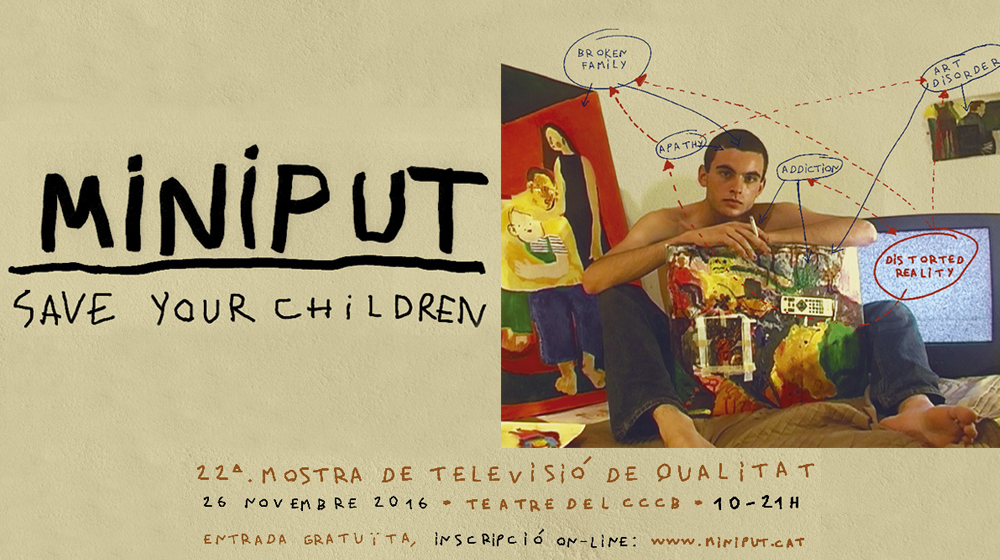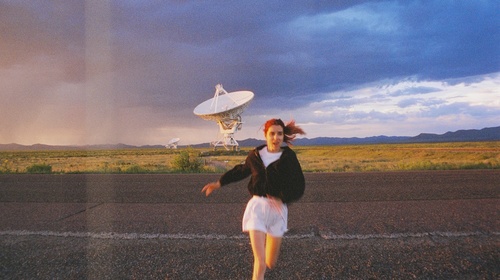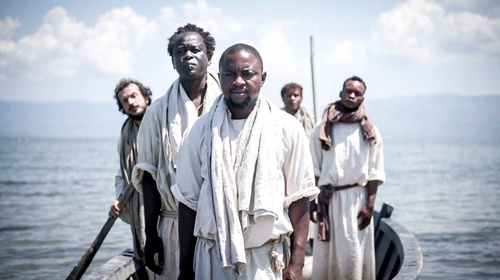MINIPUT
MINIPUT 2016
22nd Quality TV Festival
Audiovisuals
Free
MINIPUT is a festival devoted to television’s most innovative, provocative and educational programmes at the service of the public. The programmes screened are selected for their innovative, committed or experimental approach, proposing a new TV format and original use of new technologies, or generating controversy. The screening of the programmes will be presented by foremost professionals in the television world and in some cases attended by their directors.
10:00 | Presentation
With Paco Escribano (national coordinator of INPUT) and Ingrid Guardiola (coordinator of MINIPUT)
10:15 | Prison Songs
Prison Songs (musical documentary, Australia, 48 minutes, SBS)
Presented by Sira Abenoza (independent, Filosofía en la prisión)
This is a documentary musical that gets inside the major Australian issue of Indigenous incarceration. First Nation Australians are 27 times more likely to be imprisoned than other citizens. This huge jail rate occurs across Australia but is worse in the north of the country. The filmmakers spent months inside Berrimah Prison in northern Australia. Here, over 80 percent of inmates are Indigenous. They are culturally diverse, many speaking little English, but music is part of all their lives. Prison Songs is structured as both a documentary and a musical. The story chronicles the lives and circumstances of Berrimah’s serving inmates. They sing and dance musical sequences as prison life goes on around them. This expression through music gives a new dimension to these normally unheard or ignored prisoners. Audiences strongly engage with this film. Since screening on SBSTV it has been voted one of 2015’s best Australian TV shows in any genre. It has been nominated widely for festivals and awards.
11:15 | Super Stream Me + Addicted to my phone
Double bill presented by Sergi Vicente (director of BTV)
Guests: Dennis Kragelund (director of Addicted to my phone) and Nicolas Veul (director, video connection)
Super Stream Me (cross-platform, Holland, 120’, 20’ excerpt, VPRO)
This radical livestream experiment investigates the meaning of privacy in our digital age. Two young filmmakers streamed their lives non-stop for 15 days on the VPRO website, thanks to micro-cameras attached to their bodies. The images are supplemented by data on their heart rates, their moods and their real-time geolocations. The livestream was turned into a four-part documentary. Inspired by Dave Eggers’ book The Cycle, the two characters remove the boundary between their online and offline lives. What happens if other people see everything you do? What kind of person do you become if your life is one long status update? What started out as a game turned into something unbearable.
Addicted to my phone (documentary, Denmark, 40 minutes, TV2)
We store our entire lives and all our secrets on our mobiles and expect our information (images, contacts, messages, etc.) to remain private, but can we be sure? Denmark’s TV2 shows just how easy it is to retrieve private information from a mobile phone, legally and without informing the user. International firms have full access to our mobiles through a series of different apps. What are the dangers and the limits of companies’ access to big data?
12:45 | Rundfunk
Rundfunk (series, Holland, 12 minutes, KRO-NCRV)
Presented by Francesc Escribano (director of Minoria Absoluta)
This is a comedy about two best friends, Tim and Erik, who spend their time trying to do as little as possible during their final year at high school. The series combines sketch comedy with drama as it creates an absurd portrayal of that formative time at school where kids try to make sense of the world around them. Tim and Erik marvel at the sight of those strange creatures at the front of the class who call themselves teachers. The German teacher has a fascination with Hitler, the art teacher can’t control her hormones and the PE teacher has an issue with racism. Rundfunk is an antidote to the rise of sentimental high school drama. It is aimed at this audience, but it also speaks to the 20-35 year age group who shared the series with millions of comments on the net. A second season is currently being made.
13:10 | Carface + Jimmy’s War—Soldier Seeking Answers
Carface (animation short, Canada, 5 minutes, NFB)
A 1957 Chevrolet Bel Air performs an ironic take on the American ballad “Que sera, sera”. The radiator grille morphs into a cajoling pair of lips, crooning the reassuring rhymes, while a spectacularly choreographed choir of cars sings backup. A scathing satire of the power of big petrol companies, Carface is a musical comedy on a grand scale from cartoonist Claude Cloutier. The short was nominated for the Best Animation Short Film in the 2016 Oscars.
Jimmy’s War—Soldier Seeking Answers (documentary, Denmark, 44 minutes, DR)
Presented by Maria Soliña Barreiro (lecturer, Tecnocampus Mataró)
Guest: Nynne Duvaa (director)
In 2006, Jimmy Solgaard was a 25-year old soldier who decided to go to Afghanistan. Everything made sense when he was there, but now he is in serious doubt and is trying to figure out a number of issues. Has he killed people for the right reasons? Has he killed the wrong people? Did he really make a difference to the Afghan civilians? Have politicians and armed forces commanders given the true picture of the war? Jimmy has a hard time dealing with these distressing questions. In his frustration, he goes on a journey to find meaning in what he has done and in the war itself. He talks to politicians, military personnel and others who can help him find answers. The journey becomes increasingly painful as the answers start coming.
14:30 | Bipeds + The Cambodian Space Project
Bipeds (web series, Switzerland, 3 minutes, RTS)
Bipeds is a comedy series that takes the conventions used in animal documentaries and applies them to daily scenes involving young human beings. From articulate language to the wedding procession, and taking in the miracle of evolution of opposable thumbs, you and your family can rediscover all the peculiarities that make these social animals one of the most varied types of advanced hominids. Three young people, David, Laura and Leo, evolve in their natural habitat, but with the peculiarity that, technologically, the series is designed for mobiles, with the possibility of attaching different screens to enhance the narrative.
The Cambodian Space Project (documentary, Australia, 75 minutes, BBC)
Presented by Manel Jiménez (lecturer, Universitat Pompeu Fabra)
In 2009, Julien Poulson, a wandering Australian musician, walks into a Phnom Penh karaoke bar. At the microphone is Srey Thy, a poor village girl whose dream is to become a professional singer. Their meeting leads to a passionate romance and the formation of an intriguing rock ’n’ roll band, “The Cambodian Space Project”, which wowed audiences around the world. This masterly, inventive use of graphics and archive material, including personal films of Cambodia’s King Sihanouk, offers us an intimate story of intercultural and artistic challenges that take us from the ancient Khmer Kingdom of Angkor to the streets of Brixton and the Motown studios in Detroit.
16:00 | The Adventurers of Modern Art—Picasso and his Gang 1909-1916
The Adventurers of Modern Art—Picasso and his Gang 1909-1916 (cultural series, France, 51 minutes, ARTE)
Presented by Jordi Balló (UPF)
The documentary plunges us into Paris life of the early 20th century. Through illustrations, animations and original documents, the series, told like fiction, covers the period of modern art. Some of the protagonists are Pablo Picasso, Max Jacob, Guillaume Apollinaire, Gertrude Stein, Kiki de Montparnasse, André Gide, André Malraux and Robert Capa. In this episode, Picasso responds to Matisse with Les Demoiselles d’Avignon. The painting is the cause of scandal and marks the start of cubism. Not long after, the community breaks up. Picasso, now wealthy after record sales, leaves the Bateau-Lavoir, Apollinaire moves into the heart of Saint-Germain, and the poet Max Jacob is one of the few bohemians to continue living in the misery of Montmartre. When World War I breaks out, yesterday’s friends part ways for ever.
17:00 | The Fukushima Effect
Session presented by Joan Úbeda (director of Media 3.14, MEDIAPRO group)
Diggin’ Down Deep (puppet talk show, Japan, 30 minutes, excerpt, NHK)
This variety programme uses puppetry to discuss personal issues that are often too sensitive to talk about. Episode one has two guests: Miki, a “professional girlfriend”, and Hiroshi, a former CEO whose company crashed. Professional girlfriends are women who only date famous actors and athletes, and are known for their expert seduction skills. On the show, Miki reveals her surprising techniques. Hiroshi tells his story of going from millionaire to rock bottom. People feel more comfortable revealing the truth when their identity is anonymous.
Cats from Kitten Lane (real-life show, Holland, 12 minutes, VPRO)
In a giant doll’s house on Kitten Lane, mother Mimi lives with her four kittens: Django, Kate, Lotty and Patrick. Father Lucas works in Dubai as a mouse catcher. When Mimi goes to work, lazy Uncle Baldwin, who lives on the ground floor, agrees to babysit. Baldwin cares more about his Bloody Marys and naps than the family, and it is the butler, Ed, a tortoise with a penchant for karaoke—particularly Frank Sinatra songs—who looks after them. This new “real-life” show about cats came about as a low-budget series and has become a successful programme.
Folk Tale Court Room: The Trial of the Three Little Pigs (courtroom drama, Japan, 15 minutes, NHK)
This programme is an innovative blend of folktale and courtroom drama. The characters we all know are on trial. The first episode tackles The Three Little Pigs. In the story, the wolf is the wrongdoer who comes to eat the pigs, but here the defendant is the youngest pig. The programme does not give a verdict, and is designed to help children learn how to read people’s feelings, examine things from different viewpoints and express their ideas clearly and accurately.
18:00 | Radio Gaga
Radio Gaga (reality talk series, Belgium, 45 minutes, VRT)
Presented by Miquel Garcia (Head of New Formats at TV3), Michel Vanhoven (director) and Joris Hessels (presenter)
Joris Hessels and Dominique Van Malder, friends, actors and creators of Radio Gaga, travel with their self-constructed mobile radio studio to eight places in Belgium, where they spend a few days producing some extraordinary local radio. This episode is broadcast from a rehabilitation centre. They distribute transistor radios so that people can tune in to the eccentric programme with its mix of music and interviews with residents. Radio Gaga goes out in search of nuances, humour, emotions and, most of all, soundtracks linked to specific locations.
19:15 | Moments of Campaign
Moments of Campaign (Ecuador, 52 minutes, excerpt, 20 minutes, RTVECUADOR)
Presented by Matilde Delgado and Núria Garcia (lecturers, Universitat Autònoma de Barcelona)
On 17 February 2013, Rafael Correa won the elections and became president of Ecuador for the third time. 42 days previously, he embarked on a frenzied campaign to the rhythm of speeches and songs. The film follows Rafael Correa behind the scenes of the campaign, focusing on the details, the apparently insignificant events that are often more revealing than the epic moments of any public figure. More than just recording a specific historic event in Ecuador, the documentary reflects on contemporary forms of political life and their staging.
19:30 - 21:00 Special session. "Campaign: at what price?"
Introduction by Francesc Vilallonga (URL). Debate hosted by Mónica Planas (lecturer at the URL, journalist)
With the presence of Ventura Durrall (Alcaldessa), Toni Soler (Polònia), Gabriel Rufián (ERC), David Fernández (CUP) and some surprise guests
After two consecutive elections and almost a year of active and passive political campaigning, MINIPUT looks at the relation between political parties and public communication and propaganda. Over the last two years we have seen politicians guest on entertainment programmes like El hormiguero (La Sexta), En tu casa o en la mía (TVE) and Susanna Griso’s Espejo público (Antena 3). We have also seen the rise of political satire (from TV3’s classic Polònia to El Intermedio on La Sexta), the shift of infotainment from current affairs to politics (El objectivo, Salvados, La sexta noche, Las mañanas de la Cuatro or any channel), festivals and cinemas billing films that are crosses between documentary and propaganda (Metamorfosis, Alcaldessa, Informe general II...), and we are also seeing new formats, like the documentary web series that Alberto Garzón made during the campaign (Garzón on the road). We are experiencing a moment when both Soraya and Iceta are managing to redeem policies and clean up the image of their respective parties, a moment when politicians generate more controversy and public attention for what they say on Twitter than for what they do in Parliament. The campaign has ceased to be a special moment in the life of a party to become an ongoing long-distance race in multiple directions. In this session we’ll be analysing, along with its protagonists, the complex relation that exists today between traditional and new media and the political class.
This activity is part of MINIPUT
Related contents
Miniput 2016
Conference on Quality Televisio
Miniput is a festival devoted to television’s most innovative, provocative and educational programmes at the service of the public. Teaser by Boogaloo Films.


